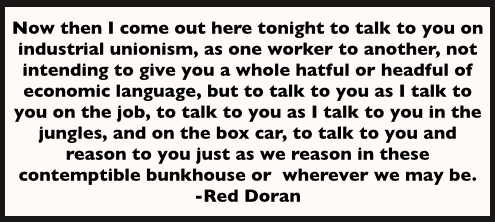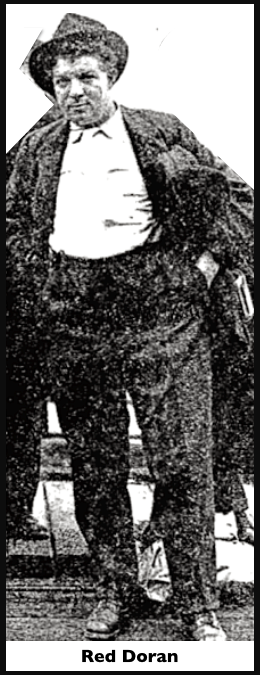
~~~~~~~~~~~~~~~~~~~~~~~~~~~~~~~~~~~~~~~~~~~~
Hellraisers Journal, Tuesday July 2, 1918
Chicago, Illinois – “Chalk Talk” by Red Doran at I. W. W. Trial
On Friday, June 28th, Attorney Otto Christensen called forth John T. “Red” Doran as a witness for the defense. In place of the usual witness chair was found a large easel and a cloth blackboard upon which Fellow Worker Red Doran launched into an illustrated address describing the current economic system and explaining how it is based upon robbery, degradation and exploitation of the many for the benefit of the few.
From El Paso Morning Times of June 30, 1918:
Red Doran, Lecturer
for I.W.W. Society,
Given Trial in Court
—–By Associated Press.
Chicago, June 29.-Red Doran, who was permitted to lecture in court [June 28th] as part of the evidence in the I. W. W. defense and spoke of alleged unsanitary conditions in northwestern lumber camps, had only spasmodic experiences as a worker in these camps, it appeared on cross examination today. He admitted that he never had worked in a lumber camp or mill, except in the blacksmith.
Charles Ashleigh, the third defendant to take the witness stand, said he became interested in the labor movement in England. In 1903 when he came to the United states he became interested in the I. W. W. in New York he said he did some work for Miss Anne Morgan.
He testified that the I. W. W., aims at industrial rather than governmental reform. In the United States, he said, there is an advanced political democracy and an industrial autocracy.
“So long as this condition exists, industry is little more than a sentiment,” he said.
Charles R. Griffith [Griffin], another defendant, related numerous experiences with his employers during 18 years spent in the woods as a lumberjack. He defended the I. W. W. propaganda and told of conditions which he said had been responsible for many strikes in the northwest lumber camps.
———-
[Photograph added.]
~~~~~~~~~~~~~~~~~~~~~~
SOURCE
El Paso Morning Times
(El Paso, Texas)
-June 30, 1918
https://www.newspapers.com/image/433019747/
IMAGE
Chg IWW Trial, Red Doran, ISR Jan 1918
https://archive.org/stream/ISR-volume18#page/n171/mode/1up
See also:
The I.W.W. Trial
-Story of the Greatest Trial in Labor’s History
-by one of the Defendants
-by Harrison George
—-with introduction by A. S. Embree.
IWW, Chicago, 1919
https://catalog.hathitrust.org/Record/100663067
-pages 77-8:
https://babel.hathitrust.org/cgi/pt?id=umn.31951d01368761a;view=2up;seq=78
On Friday, June 28th, the courtroom grew curious when a large easel and cloth blackboard were set up in place of the witness chair. [Otto] Christensen called defendant J. T. (Red) Doran as witness, and “Red” launched into a long and brilliant illustrated address [chalk-talk] upon the social structure, showing conclusively how it was based upon robbery and degradation of the many for the benefit of the few. Doran remained on the stand for cross-examination the next morning. Nebeker, more angry than wise, could only exhibit his personal spleen by such questions as “did you ever sell patent medicine on street corners?” and “How long since you did any manual labor?” On re-direct, Christensen sarcastically inquired of Doran if he knew “how long since Sammy Gompers did any manual labor?” which question was, of course, “immaterial and irrelevant” to Mr. Nebeker and His Honor.
Doran was followed by defendant Charles Ashleigh, whose fine appearance and clear cut explanation of the relative attributes and comparative values of political and industrial democracy attracted marked attention from the jury. Nebeker on cross-examination tried to make a stand for labor legislation as against “direct action.” On re-direct regarding this supposed efficacy of laws, Ashleigh stated that “labor laws are almost always but a ratification of action already taken by organized labor on the job,” and cited the case of the Welsh coal miners and how the English Parliament had to bow to union rules. During Ashleigh’s testimony Judge Landis ruled against Vanderveer introducing Charles Edward Russell’s pamphlet “Playing the Game” which shows how “labor politics” failed miserably in Australia. However, by some legal “hocus-pocus” Vanderveer was reading this material to the jury five minutes later.
Out from a group of defendants came Charles R. Griffin of the Lumber Workers I. U., No. 500, a huge bulk of a man in a blue shirt open at the collar, who gave his home address as the Cook County Jail and his vocation as a “lumber-jack or a pine-cat.” Griffin, somewhat droll in manner of expression and his lumber-jack vernacular, excited the interest of all his auditors. He went into the details of life in the northwest woods and told in simple language of the miserable life of the men who furnish the world with lumber.
[He said:]
Some camps have muzzle-loading bunks where the loggers have to crawl into pigeon-hole box beds over the end board, these muzzle-loaders being built three tiers high.
Landis lent a curious ear when Griffin told of how strikers had encountered “hard-boiled gunmen.” “What?” asked Landis of Griffin, “what is a ‘hard-boiled gunman’?” Griffin replied, “That’s a gunman who beats up on strikers without provocation,” adding apologetically, “Im talking with the only language I know, your Honor.” “That’s all right,” said Landis, smiling, “I precipitated it; you didn’t.
Fellow Worker Red Doran Speaks: Chicago, June 28, 1918
Evidence and Cross-Examination of
J.T. (Red) Doran in the case of the
U.S.A. vs. Wm. D. Haywood et al.
IWW GDC, Chicago, 1918
https://catalog.hathitrust.org/Record/100663081
Doran’s courtroom “chalk-talk” begins at bottom of page 9 and continues thru page 90.
https://babel.hathitrust.org/cgi/pt?id=umn.31951d01368704m;view=2up;seq=14
https://babel.hathitrust.org/cgi/pt?id=umn.31951d01368704m;view=2up;seq=96
At the end of his presentation he states:
Now then, usually we have questions and literature for sale, and collections and things of that kind, but coming back to the present, I think we can dispense with that part of it.
Note:
The first edition (1919) of Brissenden’s
“The I.W.W.: a Study of American Syndicalism”
lists the Doran pamphlet as a source and states
that it was published in Chicago in 1918 by GDC of IWW.
https://archive.org/stream/iwwstudyofameric00brisuoft#page/402/mode/2up
See also:
Roughneck:
The Life and Times of Big Bill Haywood
-by Peter Carlson
W. W. Norton, Incorporated, 1984
(page 271)
https://books.google.com/books?id=AsedGwAACAAJ
John T. “Red” Doran delivered an illustrated lecture on IWW economics, aided by a blackboard brought into the courtroom for the occasion. Completing this “chalk talk” Doran broke into a mischievous grin, his eyes lighting up beneath his mop of red hair, “Now, we usually have literature for sale and questions and things of that kind,” he said, “but considering the circumstances, I think we can dispense with that.” The courtroom spectators, including Judge Landis burst into laughter.
~~~~~~~~~~~~~~~~~~~~~~~~~~~~~~~~~~~~~~~~~~~~
Working Men Unite – Joe Glazer
Lyrics by E. S. Nelson
https://digital.wolfsonian.org/WOLF045327/00001/pageturner#page/15

